A Nigerian family volunteering to dig graves in Kaduna

BBC News, Kaduna
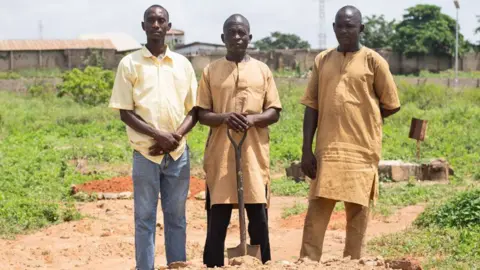 Ifiokabasi Ettang / BBC
Ifiokabasi Ettang / BBCFor more than 50 years, one family has dedicated itself to maintaining the largest cemetery in the northern Nigerian city of Kaduna – a way of thanking some residents who don’t like the job of dealing with the dead.
Until a few weeks ago, they were doing it without official payment – digging graves, washing corpses and repairing mass graves, receiving only small donations from mourners for their work.
The large Tudun Wada cemetery was reserved for the city’s Muslim residents by the authorities a hundred years ago.
The Abdullah family got involved in the 1970s when two brothers – Ibrahim and Adamu – started working there.
These two brothers now lie under the ground in the cemetery, and their sons have become the chief custodians of the cemetery.
“Their teachings to us, their children, was that God loves service and will reward us for it even if we do not gain anything in the world,” Ibrahim Abdullahi’s eldest son Magaji told the BBC when asked why they chose to continue as they did. unpaid undertakers.
The 58-year-old is now in charge of Tudun Wada – pastoral activities and 18 staff or until recently – volunteers.
He and his two younger cousins - Abdullah, 50, and Aliyu, 40, (sons of Adamu Abdullahi) – are three full-time workers, all reporting at 07:00 to work 12 hours, seven days a week.
They need to be on call because, according to Islamic tradition, a funeral must be arranged within a few hours of death.
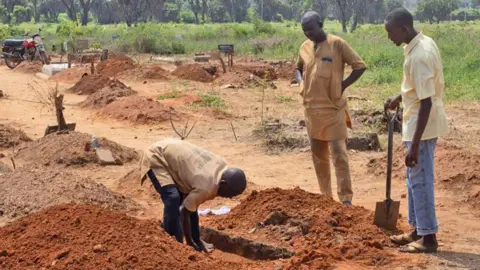 Ifiokabasi Ettang / BBC
Ifiokabasi Ettang / BBCMagaji tends to get a call on his cell phone, either directly from a relative or from an imam – all the religious leaders in town have his number.
“Many people have our numbers and as soon as someone dies, we are called immediately and go to work,” he said.
One of the three will take care of the corpse, which may include washing it and wrapping it in a cloth.
The body is measured and those details are recorded to be returned to others for digging the grave.
This can take about an hour – two people taking turns to hold down 6ft (1.8m) of earth – sometimes longer if it’s on a rocky surface in a cemetery.
They can dig about a dozen graves a day – hard work in the Kaduna heat.
“Today alone we dug eight graves and it is not yet noon, other days are like that,” said Abdullah, who started working in the cemetery at the age of 20.
The cousins have faced very difficult times – especially during religious violence when tensions between the city’s Christian and Muslim residents erupted. The two communities used to live on opposite sides of the Kaduna River.
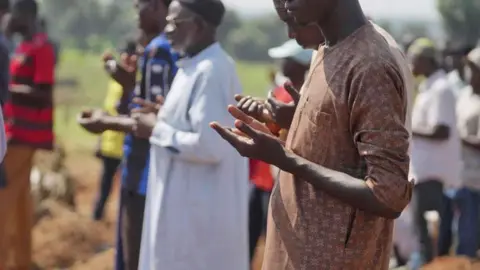 Ifiokabasi Ettang / BBC
Ifiokabasi Ettang / BBC“We have had a few religious conflicts in Kaduna, but the one that sticks out the most is the one in the early 1990s. Many people were killed,” said Magaji.
“We went and collected the dead bodies and took them out of the streets.”
Muslims were taken to Tudun Wada in the north of the city and Christians were taken to the cemetery in the south.
“It was a difficult time for me and I didn’t take long at work, but that helped me to strengthen my determination to continue,” he said.
Usually, when a group digs a grave, in the local mosque the imam announces during one of the five daily prayers that the funeral will take place.
Most worshipers then go to the place where the body was prepared for worship – it is then transported to the cemetery for burial, usually crowded with people crying.
When near a grave, the shrouded body is lowered – covered with a layer of sticks and broken pottery as a sign of respect. The grave is then filled into a slightly raised bed.
After completing the rituals and before the mourners leave, the grave keepers ask for donations.
This is often done by 72-year-old Inuwa Mohammed, the oldest worker at the cemetery, who explains the significance of Abdullah’s family in the community.
He worked with his father-in-law: “They were wonderful people who loved what they did and fed their children with this selfish habit.”
The small amount of money collected will sometimes buy lunch for the workers – but not enough for anything else. To survive, this family has a small farm where they grow food.
Cemeteries are recycled after 40 years, which means that the land is not a big problem – but its maintenance is a problem.
“There’s a lot missing right now – we don’t have enough equipment, or good security,” said Aliyu, the youngest of the cousins who has worked there for 10 years.
He explains how part of the wall collapsed, allowing those looking for scrap metal to steal grave markers.
Some cemeteries have metal plaques with name and date of birth and death – although many do not as Muslim clerics discourage display. Most are simply defined by stones and bricks or sticks.
In any case, cousins remember the location of everyone buried in a cemetery and can guide people if they have forgotten a relative’s grave.
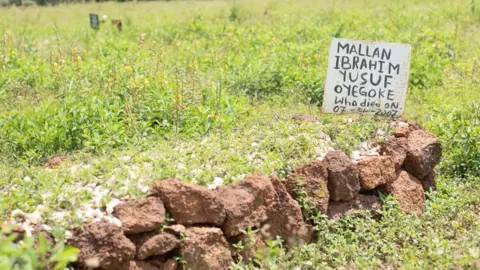 Ifiokabasi Ettang / BBC
Ifiokabasi Ettang / BBCFollowing the BBC’s recent visit to the cemetery, they witnessed a dramatic change in fortunes.
The new chairman of the local council, whose office is in charge of the area, has decided to put them on the salary list.
“They deserve it, given the great work they do every day,” Rayyan Hussain told the BBC.
“Cemeteries are the last homes for all of us and the people who do this hard work deserve to be paid, so my office will pay them as long as I am chairman.”
Magaji confirms that the workers have started receiving their monthly salary:
- five adults, including him, get 43,000 naira ($28; £22.50)
- others, including Abdullah and Aliyu, received 20,000 naira ($13; £10.50).
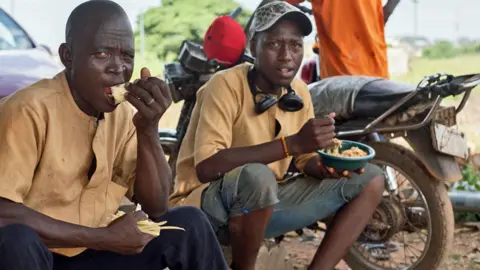 Ifiokabasi Ettang / BBC
Ifiokabasi Ettang / BBCThis is well below the national wage of $45 a month, but Mr Hussain says he hopes to increase their allowance “over time”.
He says it is sad that the cemetery was abandoned for years by the former heads of the local council.
He has plans to repair parts of the fence, install solar lights and add security, the chairman added.
“I also built a room in the cemetery where the bodies will be washed and prepared for burial, before now all this had to be done at home.
In Abdullah’s family, everything is welcome – and Magaji hopes it will ensure that one of his 23 children will one day become a cemetery caretaker.
You may also be interested in:
 Getty Images/BBC
Getty Images/BBCSource link




